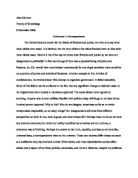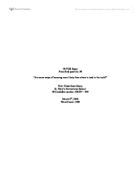This seems like a reasonable way to test the truth. Do you need anything else to establish what is true, what is good, beautiful, than consistent, repeatable results in experiments?
Unfortunately, these truth tests are not above abuse. To begin with, even empirical tests cannot be considered the ultimate truth. Hitler and his hoard of scientists believed that they had scientific proof that the Aryan race truly was superior to all other races. Of course there must have been some miscommunication when Eusane Bolt and Michael Phelps were born. Moral questions do not seem to be so concrete that they can be answered in labs by measuring the distance between point A and point B, however no one can argue that something such as the population of White-tailed deer in Northern Michigan can not be determined by empirical tests, or can they?
Even questions that are based in the “harder sciences” cannot be proved by these truth tests. David Hume took care of that when he dismantled the empiricists’ theories on perception. That which we have experienced, that which we have perceived, is subject to change. There is nothing that says tomorrow will be like today. Therefore, even an experiment repeated a hundred thousand times might be proved wrong the hundred thousand and first time. In all likely hood the sun will rise tomorrow morning, however one cannot say that he knows it will rise, thus making the Little Orphan Annie wrong.
The other truth tests have similar problems. All people experience the world differently, so a truth claim proved only by an individual’s experience should not apply universally. Logic is something made purely by our minds, and therefore it is affected by what we have learned and experienced, again something that is not universally equal. As to the authority, one obvious question appears. From where does the power of these authorities come? Obviously, someone must grant it. However, this granting of power comes from another authority, making a rather interesting infinite circle. Which authority do we believe? The Bible, the Koran, or the Torah? And when these authorities clash who’s to say which is correct. What the post modernist would argue is, he who has the most power has the most authority. In other words, if you don’t believe what I believe I’ll send in my army until you do. This seems very childish. When I was younger my and my mom would give my sister and I two pieces of cake, my sister would always take the larger one. When I would claim that’s not fair she would say “I’m bigger so try to stop me”. Expertise, although possibly more reliable than authority, comes from repeated experience, already discussed as individual and subjective.
Also, none of these truth tests can be considered universal if Hume is right and we cannot directly perceive reality. Therefore another truth theory must be offered up: coherence. Coherence, like correspondence, has two branches: subjectivism and relativism. Subjectivism says that truth comes completely from within one’s individual virtuous circle. Relativism states that truth comes from within the virtuous circles of one’s culture. The three tests in coherence all rely on proper examination of one’s virtuous circle, specifically the consistency of a claim with claims already considered true, covalence while looking for contradictions between claims, and logical entailment.
Because of this, a form of relativism may be the closest to the truth that we can achieve. Because reality cannot be known past the perceptual wall, that which we perceive may not be real. This would present a problem as what I see might be fundamentally different than what you see. Going back to my earlier reference maybe your perceptions of the common grey squirrel is very much like that of my perception of a Great White. Fortunately, Immanuel Kant saves us from such issues. Yes, he says, it is possible that we may not be viewing reality, but humans are born with identical operating systems. These systems all work with the same basic programming, making it possible to interact.
This operating system is the basis for our broadest society. According the Kant’s theory of sense data, there cannot be a universal truth…and if there is we cannot know it. However, all humans will have an inborn way of outlining morals and truths. This global society of Human is a culture. There are some global truths, like the value of twelve times fourteen. There might be some global morals as well, like a prohibition against killing one’s own kind or a right to freedom from fear.
Of course, with such a society, one might fairly wonder why such a theory does not fall simply under correspondence. Since correspondence must be universal, a global society cannot suffice. Just because all Humans are born with a certain operating system does not mean that every species or, more importantly, every intelligent life form a similar basic programming.
Our operating system lets us manipulate three dimensions and feel the effects of a fourth. But what if there was something that could manipulate four dimensions and feel the effects of a fifth? Obviously, there is something different about aliens Super Heroes on a very basic level. This difference will undoubtedly lead to how one perceives the world and so defines truth.
Naturally, someone propagating correspondence would argue that these strange beings are imagined. Perhaps everything in the universe has the same operating system; but we don’t know. However, in our own history, it is apparent that a global moral system does not apply to everyone. Within the world culture, or the operating system culture, there are subdivisions. The Spaniards did not agree with the Aztecs. The British never agree with The French. Al-Quaida does not agree with the US Government. Are there separate cultures within one operating system? If so, do they take precedence over the world culture?
These subdivisions do exist; humans who think fundamentally the same arrive at fundamentally different conclusions. This is because different regions shape us in different ways. These differences in society will create different moral systems. However we do have such a thing as global laws, but how do these exist. Just as state laws bend to federal laws, so must societal laws bend to global ones. The torturing of prisoners went against the expectations of the world culture, and so these government officials were guilty of breaking higher moral laws despite what there citizens may have argued. Unfortunately, our operating system is not specific enough to provide a complete index of every possibility. There are moral facts and truths that smaller subdivisions must decide on, issues like gay marriage, drinking, and what material things must be valued.
When you speak of these difficult subjects it is very easy to find yourself once again getting into conflicts of authority. However, when these two cultures begin to clash once again both cultures must try to understand each other, and thereby add knowledge to their virtuous circles. If an inconsistency still exists and no compromise or clear answer can be reached, there are two options. The first, the option I think heterosexuals should choose when faced with the controversy over gay marriage, is to decide that such a contradiction has no bearing on one’s self, other than there may be less fish in the pot. In this case, the issue might be one that affects only those within a culture. Unfortunately, a contradiction such as sacrificing defeated enemies for the gods is understandably a little different. The second and definitely worst option is that one culture unfortunately must forcibly defend itself from being affected by the other culture’s moral wrongness. In short, once again power is the answer.
When it comes to the question of Beauty it is once again easy to see the views of coherence. One saying that is definitely over used today is “Beauty is in the eye of the beholder”. The Correspondentist would argue that beauty is in the object itself. But if this were true would it not be true that all people would find the Mona Lisa beautiful. If Kant is to be believed people should come to the same conclusion of objects that are beautiful if there is beauty within that of the object itself. But there are many examples of exceptions to these rules. Tests have concluded that people find a healthy looking person more attractive simply for reproductive purposes, like that of any animal species on the planet. But there are people that believe the only attractive people are people missing limbs. If these people truly are the only attractive people why it that models and actors is aren’t all amputees.
Of course, coherence is not completely without fault. The subdivisions do not always work, and individuals do not always follow the morals of their societies. From this, we get the court system. Some further questions might arise from this, and there are kinks in this hierarchical system, especially when it comes to the less than perfect formation of government. Still, theoretically, coherence is more probable a response, under the arguments of Kant and Hume, than correspondence with its all-important “universal” truth can be. Whether such a theory can be practically applied is something that most people including me are still working on.







